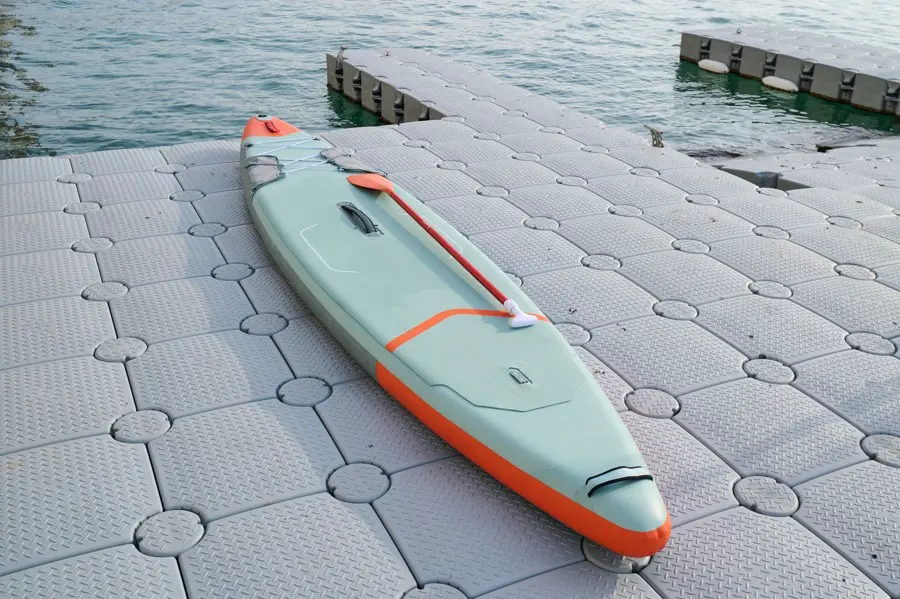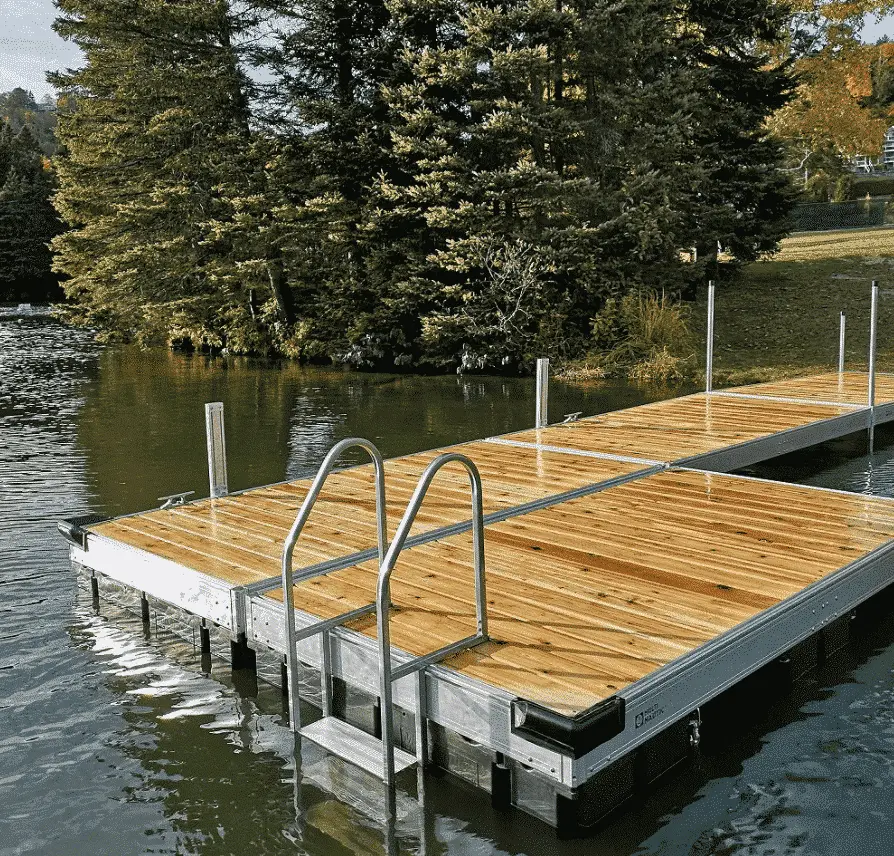
Floating Docks: What Kind to Get And How Much Do They Cost?
If you own a lake house, a floating dock is a great addition that provides a functional and aesthetically pleasing area to enjoy the water. Floating docks are versatile and can accommodate various watercraft, from small kayaks to larger boats.
Fixed docks are the most reliable and stable in places where the water level stays the same throughout the year. However, if you have water where the tide level often rises and falls dramatically or if the water freezes each season, a floating dock has advantages.
A floating dock is a platform that floats with the aid of encapsulated foam or airtight drums which makes it buoyant on the water. A gangway will connect the floating dock to the shore.

One of the reasons that floating docks have become so popular is that the dock follows the movement of the water, which makes them less susceptible to wear, making them versatile and adaptable.
While the most common use of a floating dock is for access for your boat, many lake dwellers use a floating dock in other ways. It can be used for lounge chairs, and even a barbecue. This gives an outdoor space on the lake to relax or entertain.
Here is what you need to know about floating docks for your lake house:
Table of Contents
Types of Floating Docks
There are different types of floating docks available, including plastic, aluminum and wood. Each material has its advantages and disadvantages.
Plastic docks are lightweight, affordable, and easy to maintain, but they are not as sturdy as other types. Aluminum docks are more durable and long-lasting, but they can be expensive. Wood docks have a classic look, but they require more maintenance than other materials.
Plastic Floating Docks
Plastic floating docks are made from linear low- density polyethylene (LLDPE). They are made with thick walls and no frame. The inside of the LLDPE sections are air-filled chambers which keeps the dock level and steady when in use.
This is an important feature with plastic docks as it enables the dock to move with the water, rather than have the water crashing into it and creating wear and tear.

While they are not fixed like a stationary dock, floating plastic docks can be a permanent docking option. One of the advantages with plastic is that you can relocate, alter and extend plastic floating docks, unlike fixed permanent docks.
With a plastic floating dock, you will need to connect the dock to the shore, and can do so with pilings and brackets or with a gangway. You can also anchor your floating dock with galvanized poles, dead weights or stiff arms that are attached to the shore.
Aluminum Floating Docks
Aluminum is one of the most-used metals in the world, especially for marine purposes. Aluminum is lightweight but very rugged, which makes it perfect for use in and on the water.
A floating dock made out of this versatile metal can take the impact from a boat hitting into it or the effects of a storm. It won’t warp over time or twist.

Aluminum floating docks are also low maintenance. They won’t rust, rot or need painting or refinishing. They are also easy to clean with soap and water, or with a pressure washer.
Aluminum is resistant to corrosion, but not impervious to it. An aluminum floating dock can last between 30 and 50 years.
Wooden Floating Docks
Many people like the rustic look of wood for both decks and docks, especially at a lake house. Wood is a renewable resource and can be lovely to look at.
Although a beautiful product, the price tag for a floating wooden dock can give you sticker shock. There will also be continued maintenance with a wooden floating dock.

You will need to treat the wood to keep insects from damaging it, and it will need protection from the elements in the form of a sealant. The dock will need resealing periodically to keep the wood protected.
Wooden floating docks can be damaged more easily than plastic or aluminum. If you can commit to the maintenance and upkeep of a wooden floating dock, they are a beautiful option.
How Much Does a Floating Dock Cost?
The cost of a floating dock depends on the type, size, and materials used. Plastic docks are the most affordable, with prices starting at around $1,000.
Aluminum docks are more expensive, starting at around $5,000.
Wood docks can cost between $5,000 and $10,000, depending on the type of wood used.
How do Floating Docks Stay Anchored?
Floating docks are anchored by various methods, including anchors, chains, ropes, and pilings.
The type of anchoring system used depends on the dock’s size, location, and the water’s depth and currents. Some floating docks are designed to move with the water level, while others are fixed in place.
How Stable are Floating Docks?
Floating docks are generally stable and can withstand moderate waves and wind. However, the stability of a floating dock depends on various factors, including the size, weight capacity, and anchoring system.
It is essential to choose a floating dock that can accommodate your watercraft and withstand the water conditions in your area.
What are Some Advantages of a Floating Dock?
A floating dock is low maintenance, if you use plastic or aluminum. Wood will need more upkeep.
These docks can be quick to install. Because these docks are not fixed to the lake bed, it takes less time to construct. It is also easier to remove.
A floating dock is easier to customize. Not all lakes are created equal, and you may have a spot that you would like to place a floating dock that might be difficult if you used traditional methods. Most manufacturers can make sizes, heights and colors to your specifications.
FAQs
Can I install a floating dock myself?
It is possible to install a floating dock yourself if you have some DIY skills and the right tools. However, it is recommended to hire a professional to ensure the dock is properly anchored and secured.
Can I customize my floating dock?
Yes, you can customize your floating dock to fit your specific needs and preferences. You can add features such as benches, ladders, and even a roof to provide shade.
How often should I maintain my floating dock?
The maintenance required for a floating dock depends on the material used. Wood docks require the most maintenance, and you should inspect and treat the wood every year. Plastic and aluminum docks require less maintenance but still need to be cleaned and inspected regularly to ensure they are in good condition.





